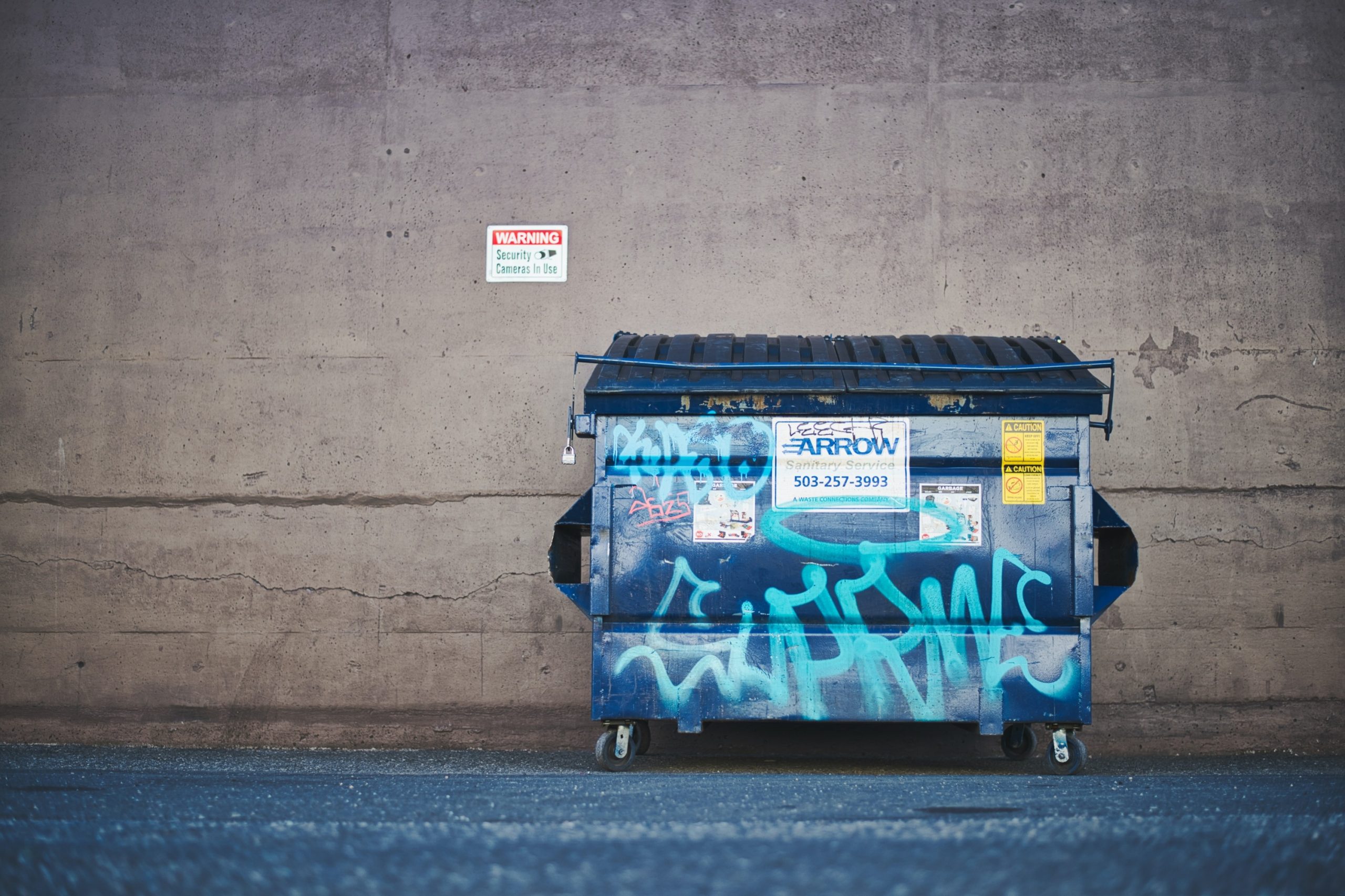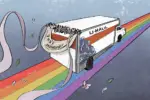By now it’s common knowledge that dumpster diving is not some cutesy term for a spectacular diving technique; it is in fact diving into trash. It is the practice of going around to search for items in dumpsters, and it can take whatever form you want. There are people who hoist themselves into the dumpster to scour through what some deem to be trash, and there are others who never once hop inside, but instead reach in and search around with just their hands or a grabbing stick.
It can sound a bit crazy if you’re not a member of the community. Why would anyone do it?
Divers have many reasons for refuse scavenging. A big reason is to fight the waste of a consumerist society that always wants more. People tend to use products only until the next trendy thing comes out or until their belongings start showing the slightest bit of wear. Items that have some life left in them are mindlessly thrown away. Divers want to combat that and give the products a new home until they are used up completely.
Making use of another’s waste also eases monetary burdens for divers. For the more skilled, dumpster diving can even be a sustainable way to grocery shop in some areas. Hunting through the garbage can produce finds from food to clothes to makeup to virtually anything you can buy. For the things one can’t find in a dumpster, the funds that would’ve been allocated to the food or other items that you didn’t have to buy can be used to buy products that are harder to scavenge .
But saving the environment and your wallet are just half of the equation. Dumpster diving can turn a profit and allow you to give back to the community. The value of goods found in a dumpster can extend beyond personal use. Dumpster divers often sell their finds through Amazon, eBay and Facebook groups, or to people they know. They sell the sanitized finds as they are, or even upcycle the finds to fetch higher prices. Even with the disclaimer that the items came from the trash, there are plenty who are willing to buy them.
Making money diving is a huge perk of the practice, but so is the option of giving back to those in need. Nonprofit organizations do not accept just anything, so not everything found in the dumpster can be shipped off to the needy. However, shelters and the like will take both sealed products and gently used non-personal-hygiene products. What one considers waste can be used to make a difference for someone in need.
All of this may seem too good to be true, and in a way, it is; dumpster diving isn’t always a huge success. To be able to support the majority of your food intake, make a profit and/or donate, you need to employ some tactics. It also boils down to getting lucky. Anyone who dumpster dives knows it’s a game of chance, but that doesn’t mean you can’t be a winner.
Dumpster diving can be more fruitful if you have a plan of action. You can easily go to the nearest dumpster and search around, but you might be better off doing some research first. There are good and bad dumpsters — surprising, I know. Some dumpsters will consistently have nothing salvageable in them; some will have only food in them while you are in the market for clothes; and some could have amazing finds, but not at the moment that you happen to be searching through them.
Know what garbage you want! If you want makeup, don’t sleuth through PetSmart’s dumpster; it’s a waste of time. Once you have in mind what you’re looking for, pick a few dumpsters that make sense to explore, then actually explore them.
Go consistently to those dumpsters every day for a few weeks. It sounds tedious, but that is the true test to see if there could be hidden treasures. Stores often have dumping schedules. Trash can be taken out every day, once a week or maybe just once a month. If you haven’t been finding goods, maybe you are looking at the wrong times. Maybe the store has yet to put out its trash, or maybe you go right after the garbage truck comes. What you want could be right under your nose if you have the patience to keep looking for it.
Once you’ve thoroughly scoped out a dumpster that has great diving potential, you need to prep for the dive with proper gear and a plan. Clothing is important when dumpster diving. Obviously you shouldn’t wear something you don’t want to get dirty. You also want to fully cover yourself, hands and feet included — and go thick, thick, thick. Wear shoes with thick soles and don your thickest pair of gloves. You don’t want glass, rusty nails or sharp material harming you in this fun adventure. You never know what you’ll find in a dumpster, be it positive or negative.
Additional gear depends on your specific situation. Are you diving at night or in an area with limited light? Bring a headlamp. A phone light or a flashlight will work, but headlamps provide a hands-free alternative in this hands-on endeavor. Don’t have the longest arms? Try bringing along a grabber or even a stepping stool (a crate works great as a stepping stool and an item transporter).
Now you’re in the dumpster, you’ve found your goodies, but what comes next? You clean. Yes, you should actually clean the trash. Proper dumpster diving etiquette is to leave the dumpster nicer than it was when you found it. It’s common decency, first and foremost, but it also helps keep dumpster diving legal. If you leave trash around, it will tip off other parties that someone is rummaging through the trash. Even if the store is accommodating to dumpster divers, they may become irritated with the added hassle of cleaning up someone else’s mess and do away with their dumpster diving permissiveness. Don’t ruin the experience for everyone else and get dumpster diving banned in your area.
There are lots of rookie mistakes that can turn dumpster diving from a beneficial activity to a dangerous or outlawed one. Dumpster diving isn’t all rainbows and sunshine. Some dumpsters have pressers installed, meaning you could end up being crushed if you’re in the dumpster and the presser gets activated. Please make sure to check the dumpster before you dive in so as not to risk your life. No piece of trash is worth it.
Nor is it worth jail time. Make sure what you are doing is legal. Dumpster diving is legal nationwide in the United States, but you will need to check if your specific state, county and city allows people to dumpster dive. If you live outside of the U.S., you will need to check your country’s laws.
After finding out if it’s legal, you then have to go on a dumpster-by-dumpster basis. Dumpsters with “no trespassing” signs, fences and locks are all illegal to dive into. A dumpster that is up against a building is classified as private property and can also land you in legal trouble. Better just to avoid these dumpsters.
Another way to err on the side of caution is to avoid people, even if what you’re doing is legal. Bystanders may misunderstand what you’re doing and call the police. You could be charged with loitering, littering, trespassing or disorderly conduct. Consider whether finding a mega dumpster haul is worth the hassle of dealing with the authorities.
If you do end up with some finds after taking these precautions, you are home free; you just need to get home. You can go about transportation any number of ways, but the most recommended is a car. If you can, park the car close to the dumpster. You can get in and out quickly without being as noticeable. Make sure to have some tarps to cover your seats or some boxes to put your dumpster finds into to avoid unnecessary mess. You’re bringing trash home, but you don’t want to dirty everything else in the process.
Once you’re home, all you have to do is sanitize. Dumpster diving is often perceived as disgusting. People imagine rotten food and gunk-laden items. It’s mostly products in good sanitary condition, though. After a bit of alcohol for sterilization, they appear as if you bought them from the store. They did originally come from the store, in fact, but you got them for free instead of buying them. Even if they are slightly used (think tester items, returned items or opened items), you can sanitize them — professional makeup artists do this all the time. Things can be sanitized so that what was once “disgusting” is now perfectly “normal.”
Not quite ready to dive in? You don’t have to be the next great dumpster diver. You can still work to achieve its environmentalist goals. You can change your thinking about what you consider unusable trash. You can track your consumption and aim to produce less waste. You can lobby the government and corporations to combat their own waste. You can donate what items you no longer want to the needy. There are many avenues to explore that don’t involve diving into dumpsters. Once you try it, though, you may become addicted and never look back.















